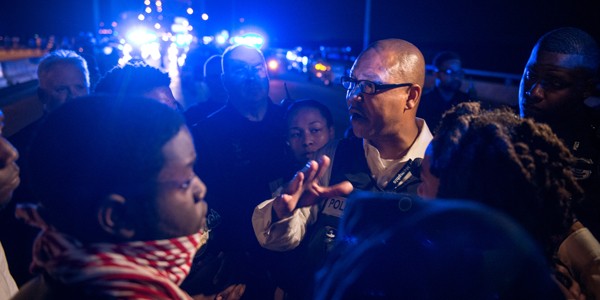 Brandon Dill
Brandon Dill
Michael Rallings with crowd during protest
In response to news coverage of a recent court ruling saying that Memphis violated a 1978 consent decree by gathering political intelligence on protesters, Michael Rallings, director of the Memphis Police Department (MPD), said Tuesday that some of the language in the reports “does not accurately reflect the department’s activities.”
Specifically, Rallings said the terms “surveillance” and “spying” are “erroneous.”
Rallings also said the city’s goal has been to be transparent about the issues involved in the case, ACLU of Tennessee, Inc vs. City of Memphis.
“In fact the only reason many of the articles were printed in the first place is because we voluntarily unsealed documents and posted them on the city website for the world to see,” Rallings said.
[pullquote-2]
Set to go to trial Monday, August 20th, the case is the result of a lawsuit against the city for gathering political intelligence on protesters over a two-year period through social media and other mediums. Rallings said he can’t speak at length about ongoing litigation but “feels compelled to explain a few things”:
-The terms “surveillance” and “spying” are “erroneous,” and were never used in the court’s order. “Those words conjure up images of officers in unmarked vans on the street corner listening to tapped phone conversations. This does not accurately reflect MPD’s activities, or its motivation, regarding the monitoring of events which are the subject of this lawsuit.”
-Officers look at social media posts to help us gauge the size and intensity of demonstrations so that we can properly provide for public safety. This is also an effective tool in stopping criminal activity such as sexual predators, domestic violence, stalking, and threats. We also use other technology, such as body cameras, SkyCops, and security cameras in our law enforcement efforts to keep Memphians safe.
-Monitoring of social media posts and the usage of modern technology such as body cameras are considered to be best practices in policing nationwide. Various media reports show that many other cities, such as Boston, Charlotte, Denver, Little Rock, San Jose, and Seattle, use social media monitoring. In the aftermath of last year’s Charlottesville riots that resulted in about 40 casualties, including three deaths, the after-action recommendation said that monitoring social media is crucial to protecting public safety.
[pullquote-1]
“We feel like we have been complying with the consent decree as it would apply to today’s world,” Rallings said. “We need to be able to read these posts and use them as part of our decisions about how we deploy resources, since we are responsible for the safety of all involved.”
Protest and counterprotest can cause “mayhem and loss of life,” Ralling said, but proper social media monitoring helps the agency prepare and respond to those types of events.
“These tools enabled me to ensure that the 2016 bridge protest was peaceful and without injury,” Rallings said. “Without these tools, I believe that night would have ended very differently We will, however, follow the judge’s order.”
Rallings said if the judge rules in favor of the plaintiff, then the department will “find a way to balance public safety with complying with the manner in which the court interprets the consent decree.”